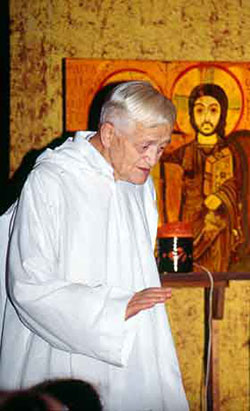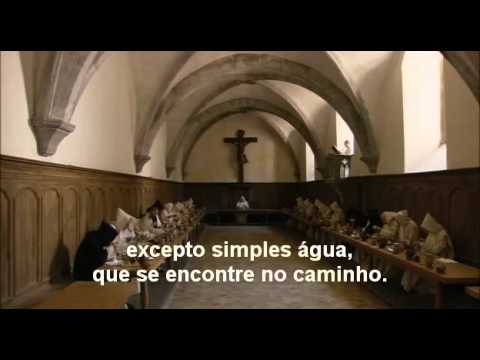A week before Christmas, when Christians celebrate God’s incarnation in Christ, the 3D movie Avatar (warning: spoilers follow) took movie-going to a new level in a similar way that Star Wars did in 1977. Although there has been criticism of Avatar’s story content, and even Vatican panning of its spirituality, it is IMO worth drawing ideas from it for Christian spirituality. It may also help in clarifying our own positions.
In this movie, set in 2154, an avatar is a remotely-controlled body. This avatar is composed of human DNA mixed with Na’vi DNA. Jake becomes one of the Na’vi in order for them to understand him better and he them. He falls in love with the Na’vi and specifically with Neytiri. He is willing to give the ultimate sacrifice to save them. There are clear allegorical parallels with the incarnation. But some significant differences, also, that can help clarify Christian understanding of the incarnation.
This is an avatar of an other sentient race – not of God (called “Eywa” by the Na’vi). Often there is confusion about Christ’s incarnation. Many think in terms of Jesus being “son of God” because of the virgin birth story – imaging Jesus as being half human, half divine. The early church settled that Jesus is fully human. All 46 of Jesus’ chromosomes (using contemporary understanding unknown to the biblical writers) are fully human chromosomes. In the movie’s avatar, Jack’s DNA is mixed – human and Na’vi. (As a result of this mixing, the avatars are certainly not fully Na’vi. Avatars have five fingers and toes on their hands and feet. Na’vi only have four.)
Many think in terms of Jesus being “God dressed up” – they would image the child Jesus pretending to learn Aramaic at home and pretending to learn the skills of the family trade, while actually critiquing mistakes in Einstein’s Theory of Relativity. The early church settled that Jesus’ full humanity has no “trap door” to his divinity. He learned just like we do – he does not pretend to be human. In the movie the avatar does not have the Na’vi mind, but the human mind. It is here IMO that we need to make the most careful distinction between the Christian concept of incarnation and the movie’s concept of avatar. Jesus has a created human soul and a created human mind, the early church teaches. That the eternal Word replaced the human soul of Jesus (akin to what happens with the avatar) is the heresy of Apollinarianism. Jesus is not God pretending to be human (docetism), not actually Superman pretending to be the mild-mannered reporter, Clark Kent.
Even the death and resurrection sequence that ends the movie can be used in Christian reflection.
There is much more that is worth reflecting on:
- Our attitude to, unity with, and responsibility to nature and to all creation
- Greed
- Love
- A lot is clearly intended to be allegorical – eg. the title of the moon “Pandora”
- a holistic spirituality
- attitudes to and limitations of technology
Quotes:
“Every person is born twice. The second time is when you are part of your people forever.”
Jake Sully: “Everything is backwards now, like out there is the true world and in here is the dream.”
Sully tells Mo’at (the mother) that he is “empty”. This alludes to US Marines calling themselves “jarhead” in part to mean that their heads are empty.
“I see you” – looking inside a person, not just outside. Cf the biblical “know”.
The art of René Magritte is mentioned in Sigourney Weaver’s description of Pandora. Unacknowledged, however, is the art of Roger Dean, particularly “Floating Islands” and “Arches”:
The Na’vi language was created by linguist Paul Frommer. Around 500 words were created. You can find out more about the language here, on the Pandora wiki being developed.
Anglicans will recognise the cartwheel image of ordination at one point in the movie typical in Anglicanism.
For fun, you can make an avatar of a photo of yourself here. For better or worse, here is mine:
![]()
Allusions and connections with other movies: Surrogates, the Matrix, Dances with Wolves, Existenz, The Wizard of Oz,…
Please add your thoughts and comments…







“Is Christ God’s Avatar?” (didnt watch the movie- going on WITH WHAT I HAVE SEEN OF THE TRAILER)
before i start- one interesting analogy deserves another interesting analogy
“Is OBAMA racerelation’s avatar?”
The beauty of any analogy stems from the intricacies of its limitations. One of the masters of analogies was Christ himself. and with that said: the answer is NO, HE IS MORE THAN AN AVATAR, his mission may be that of an avatar.
HOWEVER:
If it helps a subject understand his need for salvation and as a result of it, the subject amends his life and repents and follows the Lord ( i think like Paul refered in one of his epistles) – bad theology- right orthopraxy….GOD himself can fix the former.
let’s be cautious however, in subjectivizing “God’s avatar” by picking and choosing what the valid similarities are in our own head. The movie isn’t by anymeans the word, and the WORD is definitely NOT in the movie, so attempts of deifying ideologies catalyzed by the movie should be decried.
I’m not sure if it is the rubble of the fallen ‘christian’ culture, or God’s grace extended to us, but many films seem to contain little bits of the Gospel.
Granted those glimpses are distorted and limited, but still these films allow the viewer to experience a story which would take them away from their reality and place them in a far greater story.
Stories of redemption and transformation have a universal appeal. How can we tell the Gospel story in such a way that everyone will desire to experience it, not simply remaining a passive viewer.
Good thoughts here but what does ” the cartwheel image of ordination” mean?
Emma, I am not sure if any other denomination follows this image (maybe readers can comment), but Anglicans/Episcopalians regularly ordain priests & bishops forming a circle cartwheel-like around the candidate. I cannot quickly locate a photo online – the first I could find for you using google is here. In ordaining priests, there is often an outer ring of priests laying hands on the inner ring laying hands on the candidate. If you see the movie you will recognise the moment immediately.
I knew what you were referring to immediately Bosco. Rather than a cartwheel, I describe it as a sunburst! I turned to my 12 year old daughter and said: “That’s what they do when someone is made a Bishop!” It has to be the visual high spot of any consecration and it was interesting that James Cameron chose it in the film. I wonder if he’s any Anglican connection?
Great article BTW Bosco. Thanks for teasing out the points above and asking some challenging questions to get us thinking!
Hmm, seems like my reply didn’t stick. Had major internet problems yesterday! Thanks for your Bosco. I’m a C of E Christian and have only been to a couple of ordinations which were a long time ago which is why I missed it! As I have been involved with other spiritualities for the last couple of years I saw mostly pagan ideas in the film, mostly the interconnected and interdependance of all living things. Thanks for pointing out the christian element!
Also, have you noticed how film goers are reporting feeling berift and depressed after watching the film. They say they are dispondant as they realise their life is so much less than it could be. I think there is a real mission point to be had here.
I find what you say interesting- some valid points raised but, over-all, I can’t agree. Avatar annoyed me, I walked out of the cinema feeling irritated and wanting to kick one of those silly blue things! 🙂 I saw it as a film that emerges from an increasingly Godless society desperately searching for some sense of the spiritual. To my mind it was very much more Pagan than Christian. I think that Emma’s point about the film leaving people feeling despondent is important. Avatar doesn’t offer a genuine spirituality but, rather, a big bag of special effects and a dose of Goddess worship. I despair that so much money was spent to accomplish so little when so much of the world’s population still don’t have adequate food and water.
This article by a self proclaimed ‘rationalist, ‘atheist’, ‘humanist’ is worth a look. I agree with him about the film generally but totally disagree with his claim that the film is Christian or ‘messianic’. I’ll keep insisting that the fairly weak spirituality it contains is Pagan to the core.
http://www.scribd.com/doc/24688186/Film-Rave-1
Below are two good reads re: Avatar’s strengths and weaknesses:
Caveat: Spoiler Alert!
Avatar, Parsnips and Aboriginal Agony | Steve Bell |
David Brooks: The Messiah Complex – NYTimes.com
And why shouldn’t Avatar have both strengths and weaknesses, getting so much so very right and quite a bit wrong, too? That reflects my own brokenness. Our coming together makes us whole. Avatar has much wheat and a good bit of chaff, they say? Sounds like my journey. I’m looking forward to seeing it.
Putting the best of Brooks & Bell together (see articles in previous post), what if we set aside our racial-cultural lenses to interpret each individual in the film, color-blindly & w/o cultural biases, each as a part of our own selves w/our own biases. Then, we might receive the film’s message in quantitative terms, which is to say that one person brought a more rational, dualist, problem-solving approach and that was enough to complement the more predominant, nondual approach of the other protagonists.
IOW, our greatest value-realizations in our relationship to self, other, God and the environment will come from a more robustly nondual stance, which enjoys a primacy but not an autonomy vis a vis our rational approaches to reality. Put most simply, humankind needs a LOT more nonduality and a lot less dualistic problem-solving; but we clearly need BOTH to best realize life’s values.
I am pleased you noticed the Roger Dean influence. I am hoping the Roger Dean will get some credit at some point for this.
Just in reply to Mr StanmoreRob. I am really surprised at your response to this movie. You must have gone in with some preconceived ideas that there was some religious message of something(?) I loved the message re the environment. We have raped our own planet in exactly this manner and this movie illustrates that. Pagan or otherwise the idea of connectedness and respect is there in spades and is a good thing. I think the cost of the movie is irrelevant.
I suggest you widen your perspective otherwise you are going to be constantly disappointed (or stop going to fantasy movies)
I went to Avatar for a second time yesterday and figured out why some people overseas come out feeling despondent (as mentioned in comments above & in some reviews). They are sad they are not living in New Zealand where so much of the movie’s beauty was clearly filmed. 🙂
During the movie, I was momentarily messed up by many of the similar things that were been discussed here, but for the most part, I dismissed them as my expectations progressed. Even the over zealous depiction of “corporate greed” or the “over-zealous military commander” were accepted as being a important section of the story.But there one technical thing that (oddly enough, I guess) irritated me. There was no way to go back and view it again, but I’m pretty sure that when the Colonel was killed, he took his hands off the robot controls, trying to remove the arrow/bolt. Yet, with the Colonel’s death, the robot TOPPLED OVER! I would have expected such a machine just to simply stop moving and stand there.
I like the Avatar 3D film, especially the story line, not solely it brings a very new feelings but inspiring ideas of humanity. I heard the New Avatar 2 is comming soon, cannot wait to watch it again…!
I had previously decided not to watch this movie, thinking it would be too weird. I’m glad I decided to watch it. It turned out to be one of the best I’ve ever seen. However, I believe that our own world is even stranger, more beautiful and mysterious than Pandora. So lets keep it clean and learn to share it. It belongs to all of us.
3d movies are so cool, i just wish that we could watch 3d movies on TV*,,
Are you seriously comparing the Christian belief to the beliefs of the Na’vi? If there are any beliefs that should be compared to Avatar’s ‘Eywa’, It should be hindoism, Pagan beliefs or Shamanism. They are nature-based or spiritual based, sorta like in the movie. I havn’t read the whole story, but please, don’t make any link between the Christian beliefs and the one from the movie Avatar, it isn’t the same at all, in ANY way.
By, “I havn’t read the whole story”, Sander – it appears you mean this post.
While not wanting to subtract from your brilliant analogies, I saw Avatar on TV on New Year’s Day and wasn’t impressed. It seemed to be a pretty clear analogy on development in the Amazon. So why didn’t they just set it in the Amazon? Could it be that marketing executives considered handsome, tall blue people with perfect teeth more attactive to the film’s target demographic than indigenous Amazonian tribespeople?